五上M1单词表及知识点
外研版(一起点)小学五年级 上册课本M1知识小结
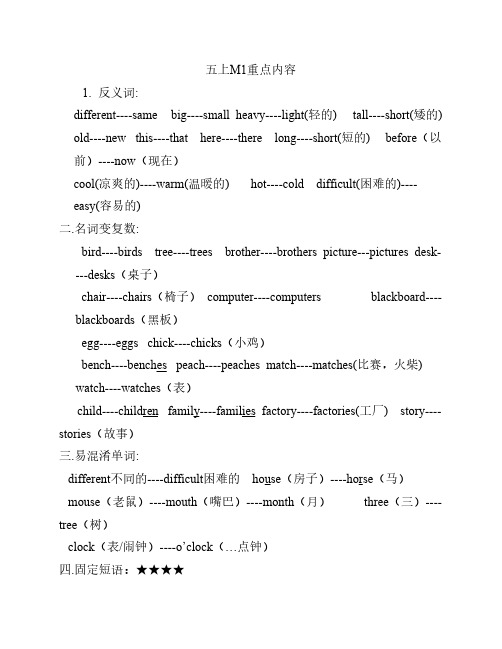
五上M1重点内容1. 反义词:different----same big----small heavy----light(轻的) tall----short(矮的) old----new this----that here----there long----short(短的) before(以前)----now(现在)cool(凉爽的)----warm(温暖的) hot----cold difficult(困难的)----easy(容易的)二.名词变复数:bird----birds tree----trees brother----brothers picture---pictures desk----desks(桌子)chair----chairs(椅子) computer----computers blackboard----blackboards(黑板)egg----eggs chick----chicks(小鸡)bench----benches peach----peaches match----matches(比赛,火柴) watch----watches(表)child----children family----families factory----factories(工厂) story----stories(故事)三.易混淆单词:different不同的----difficult困难的 house(房子)----horse(马)mouse(老鼠)----mouth(嘴巴)----month(月)three(三)----tree(树)clock(表/闹钟)----o’clock(…点钟)四.固定短语:★★★★two years ago两年前 the pig’s house猪的房子 a big mouse一只大老鼠the cat’s house猫的房子in London在伦敦 in China在中国for two years长达两年look different看起来不同 some benches一些长凳 feed the birds喂鸟in my family在我的家里 three children三个孩子 look at…看… two years两年look at the pictures看照片 look at the pictures of our school看我们学校的照片a picture of…一张…的照片 lots of=a lot of许多 little trees小树 tall trees 大树a small playground一个小操场 a big playground一个大操场in the classroom在教室里a beautiful chicken一只漂亮的鸡 on the floor在地板上 four eggs四个鸡蛋four round brown eggs四个圆形的、褐色的鸡蛋 cute yellow chicks可爱的黄色小鸡talk about…谈论… talk about the changes at your school谈谈你学校的变化五.单词的特殊用法:ago同义词before(以前) wasn’t=was not weren’t=were not isn’t=is not aren’t=are notwon’t=will not haven’t=have not六.常用的地点:house房子 playground操场 park公园 zoo动物园 shop商店 farm农场pond池塘supermarket超市 station火车站 airport飞机场 school学校 classroom教室factory工厂 room房间 pool水池/游泳池 hill山 mountain山 slide滑梯swing秋千七.重点句型:★★★★1.Lingling is(be)in London with Sam and Amy.玲玲和萨姆、艾米在伦敦。
沪教版五年级上英语M1U1知识整理

Module 1 Unit 1 My birthday一、词汇:1. party[ˈpɑ:ti] 派对;聚会parties2. bring [brɪŋ] 带来,拿来3. sound [saʊnd]动,听起来;名,声音4. interesting[ˈɪntrəstɪŋ] 有趣的5. first [fɜ:st] 第一6. second [ˈsekənd] 第二;秒钟7. third [θɜ:d] 第三8. fourth [fɔ:θ] 第四9. fifth [fɪfθ]第五10. sixth [sɪksθ] 第六11. twelfth [twelfθ] 第十二12. invitation [ˌɪnvɪˈteɪʃn] 邀请函13. still [stɪl] 仍然14. begin [bɪ’gɪn] 开始beginning15. wear [weə]穿put on 穿上16. smart[smɑːt] 时髦的二、句型和语法:1. 基数词:one, two, three, four.....表示数量。
2. 序数词:表示顺序,除first, second, third外,大多数序数词是在基数词后面加th 变化来的。
变化规则如下:1)与基数词完全不同:first, second, third2) 在基数词后面加th: four-fourth, six-sixth, seven-seventh, ten-tenth3) 以t结尾的,直接加h: eight-eighth4) 以e 结尾的,去掉e,再加th: nine-ninth5) 以ve结尾的,把ve改为f, 再加th: five- fifth, twelve-twelfth6) 以y结尾的,把y改为ie, 再加th: twenty-twentieth, thirty-thirtieth7) Twenty-one,twenty-two, .....twenty nine等复合基数词变序数词时,个位数字变成相应序数词,十位不变:twenty-one-twenty-first, thirty-nine- thirty-ninth 3. 问日期:What’s the date today? It’s the first of September. /It’s September the first.4. when: 询问某件事什么时候发生,通常问的是某一天。
5年级英语上册
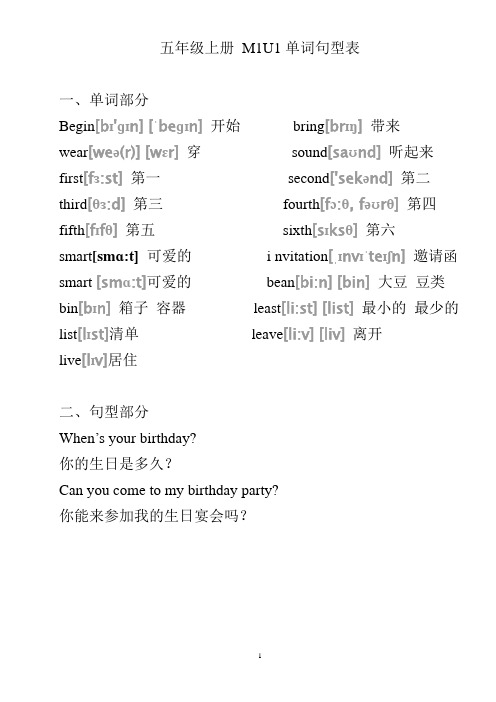
五年级上册M1U1单词句型表一、单词部分Begin[bɪ'ɡɪn][ˈbeɡɪn]开始bring[brɪŋ]带来wear[weə(r)][wɛr]穿sound[saʊnd]听起来first[fɜ:st]第一second['sekənd]第二third[θɜ:d]第三fourth[fɔ:θ, fəʊrθ]第四fifth[fɪfθ]第五sixth[sɪksθ]第六smart[smɑ:t]可爱的i nvitation[ˈɪnvɪˈteɪʃn]邀请函smart [smɑ:t]可爱的bean[bi:n][bin]大豆豆类bin[bɪn]箱子容器least[li:st][list]最小的最少的list[lɪst]清单leave[li:v][liv]离开live[lɪv]居住二、句型部分When’s your birthday?你的生日是多久?Can you come to my birthday party?你能来参加我的生日宴会吗?5A M1U2单词句型表一、单词部分Only[ˈəunli][ˈonli]仅只有taxi['tæksɪ]出租车arrive[ə'raɪv]到达left [left]左边right[raɪt]右边correct[kə'rekt]正确的journey['dʒɜ:nɪ][ˈdʒɚni]旅行finally[ˈfaɪnəli]最后pavement[ˈpeɪvmənt]人行道mad [mæd]疯的underground[ˈʌndə'ɡraʊnd]地铁traffic lights[ˈtræfik laits]交通灯zebra crossing[ˈzi:brəˈkrɔsiŋ]斑马线二、句型部分Walk to school走路去上学How do you come to school?你怎么去学校?What about you?你呢?5AM1 U3 单词句型表一、单词部分Aeroplane[ˈeərəpleɪn]飞机worker['wɜ:kə(r)]工人farmer['fɑ:mə(r)][ˈfɑrmɚ]农民pilot['paɪlət]飞行员cook[kʊk]厨师sick[sɪk]生病的dream[dri:m][drim]梦想的writer[ˈraɪtə(r)]作家suddenly[ˈsʌdənli]突然地cry[kraɪ]哭save[seɪv][sev]拯救lifeguard['laɪfɡɑ:d]救生员brave[breɪv][brev]勇敢的different[ˈdɪfrənt]不同的in the future 在将来be good at sth 擅长....shop assistant[ʃɔp əˈsistənt]售货员二、句型部分What do you want to be?你想成为什么?I want to be a pilot.我想成为一名飞行员Can I ask you some questions?我能问你一些问题吗?I want to travel around the world.我想去环游世界5AM2U1单词句型表一、单词部分grandchild[ˈgræntʃaɪld]孙子strange[streɪndʒ]陌生的arm[ɑ:m]手臂hug[hʌɡ]拥抱hunter['hʌntə(r)]猎人show[ʃəʊ][ʃo]展示laugh[lɑ:f][læf, lɑf]笑flat[flæt]公寓past[pɑ:st][pæst]过去的puzzle ['pʌzl][ˈpʌzəl]迷惑的cup[kʌp]杯子brush[brʌʃ]刷子on one’s way to....在某人去....的路上Live with sb 与某人住在一起write an-email 写邮件go shopping 去购物go to cinema 去电影院do housework 做家务have a cold 感冒play chess 下棋二、句型部分How often do you visit them ?你多久去看他们一次?I visit them once a week我一周去看他们一次Are you all right?你还好吗?5A M2U2单词句型表一、单词部分Same[seɪm][sem]相同的both [bəuθ][boθ](两者)都all[ɔ:l][ɔl]所有的member[ˈmembə(r)]成员match[mætʃ]比赛sugar['ʃʊɡə(r)]糖difficult['dɪfɪkəlt]困难congratulation[kənˈgrætʃuˈleɪʃn]祝贺恭喜cross the street 过街after school 放学后5AM2U3单词句型表一、单词部分North[nɔ:θ]北east[i:st]东south[saʊθ]南west[west]西sunshine['sʌnʃaɪn]阳光through[θru:][θru]穿过move[mu:v][muv]移动enough[ɪ'nʌf]足够的miss[mɪs]想念must[məst][mʌst]必须roof[ru:f][ruf屋顶far from 离...远wild geese 大雁二、句型部分Why do you like it?你为什么喜欢它?Because it’s quiet.因为它很安静It sounds great听起来很不错5AM3U1单词句型表一、单词部分crossing[ˈkrɒsɪŋ]十字路口hotel[həʊ'tel] [hoˈtɛl] 旅馆bank[bæŋk]银行hospital['hɒspɪtl]医院bakery['beɪkərɪ]面包房museum[mjuˈzi:əm博物馆cinema['sɪnəmə]电影院crocodile['krɒkədaɪl]鳄鱼ocean['əʊʃn]海洋shark[ʃɑ:k][ʃɑrk]鲨鱼dolphin['dɒlfɪn]海豚size [saɪz]尺寸naughty['nɔ:tɪ][ˈnɔti]淘气的giraffe[dʒə'rɑ:f][dʒəˈræf]长颈鹿Walk along 沿着...走turn left 左转after that 然后二、句型部分How do I get to ....我怎样才能到.....5AM3U2单词句型表一、单词部分Pretty['prɪtɪ]漂亮的button['bʌtn]纽扣zip[zɪp]拉链pocket['pɒkɪt]口袋emperor['empərə(r)]皇帝nod[nɒd]点头smile[smaɪl]微笑keep silent 保持沉默try on 试穿二、句型部分Which do you like ?你喜欢哪一个?How much is it?它多少钱?5AM3U3单词句型表一、单词部分Fever['fi:və(r)]发烧toothache[ˈtu:θeɪk]牙痛cough[kɒf]咳嗽dentist[ˈdentɪst]牙医either[ˈaɪðə(r)]也king[kɪŋ]国王hide[haɪd]藏secret['si:krət]秘密的隐蔽的cave[keɪv][kev]洞穴present['preznt]礼物hurt[hɜ:t]受伤toothless[ˈtu:θləs][ˈtuθlɪs]无牙的pull out 拔出拉出be bad for 对....有害take some medicine 吃一些药have a cold 感冒二、句型部分What should I do ?我应该做什么What’s wrong with you?=what’s the matter ?你怎么了5AM4U1单词句型表一、单词部分Tea[ti:][ti]茶teapot[ˈti:pɒt][ˈtiˈpɑt]茶壶pour[pɔ:(r)][pɔr]倒,泼first[fɜ:st]首先next[nekst]然后then[ðen]然后finally[ˈfaɪnəli]最后report[rɪ'pɔ:t]报告part[pɑ:t]部分raindrop[ˈreɪndrɒp]雨点inside[ˈɪn'saɪd]在里面cage[keɪdʒ]笼子cheap[tʃi:p][tʃip]便宜的Yangtze river ['jæŋzɪ]['rɪvə(r)]长江boil the water 烧开水a glass of water 一杯水5AM4U2单词句型表一、单词部分Windmill['wɪndmɪl]风车gently[ˈdʒentli]温和地strongly[strɒŋlɪ]强烈地slowly[ˈsləʊli]慢慢地quickly[ˈkwɪkli]快速地trunk[trʌŋk]树干wind-bell['waɪndb'el]风铃be made of 由......组成go out 出去二、句型部分It’s raining heavily雨下得很大We mustn’t play with matches我们不能玩火5AM4U3单词句型表一、单词部分Campfire['kæmpfaɪə(r)]营火burn[bɜ:n]燃烧luckily['lʌkɪlɪ]幸运地country[ˈkʌntri]国家sign[saɪn]告示heat[hi:t][hit]热light[laɪt]光raw[rɔ:]生的lift[lɪft]电梯crawl[krɔ:l][krɔl]爬行smoky['sməʊkɪ][ˈsmoki]有烟雾的dangerous[ˈdeɪndʒərəs]危险的hate[heɪt][het]不喜欢讨厌helicopter['helɪkɒptə(r)]直升机firefighter[ˈfaɪəfaɪtə(r)]消防员stone age 石器时代Be careful 小心die down 熄灭throw away 扔掉二、句型部分We mustn’t play with matches我们不能玩火。
外研社英语 一起 五年级上 M1--M10模块重点
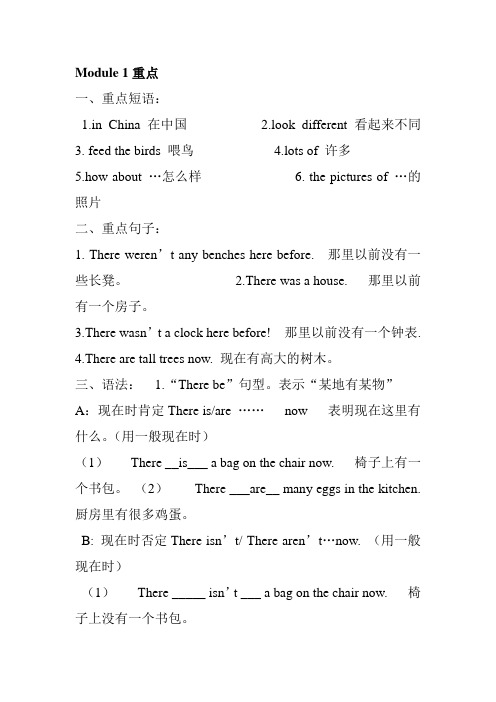
Module 1重点一、重点短语:1.in China 在中国2.look different 看起来不同3. feed the birds 喂鸟4.lots of 许多5.how about …怎么样6. the pictures of …的照片二、重点句子:1. There weren’t any benches here before. 那里以前没有一些长凳。
2.There was a house. 那里以前有一个房子。
3.There wasn’t a clock here before! 那里以前没有一个钟表.4.There are tall trees now. 现在有高大的树木。
三、语法: 1.“There be”句型。
表示“某地有某物”A:现在时肯定There is/are ……now 表明现在这里有什么。
(用一般现在时)(1)There __is___ a bag on the chair now. 椅子上有一个书包。
(2)There ___are__ many eggs in the kitchen. 厨房里有很多鸡蛋。
B: 现在时否定There isn’t/ There aren’t…now. (用一般现在时)(1)There _____ isn’t ___ a bag on the chair now. 椅子上没有一个书包。
(2)There ____ aren’t ___ many eggs in the kitchen. 厨房里没有很多鸡蛋。
C:过去时肯定There was/were……before. 表明以前这里有什么。
(用一般过去时)(1)There____ were _lots of little trees here before. 以前这里有许多小树。
(2)There_____ was __a supermarket here before. 以前这里是一个超市。
外研版(一起点)小学五年级上册课本M1知识小结
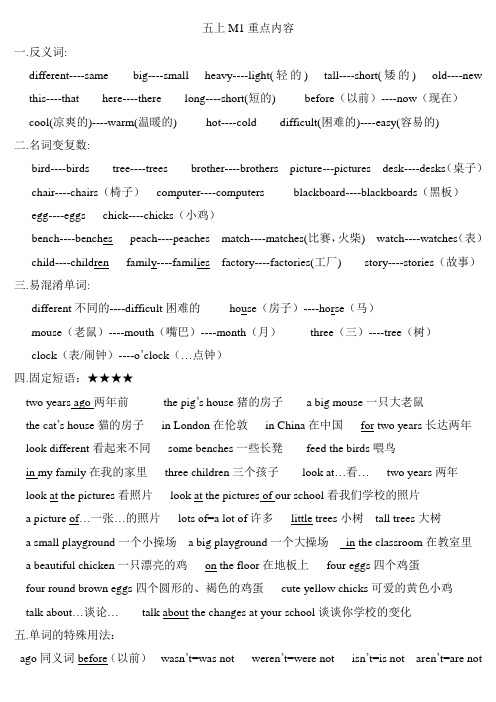
五上M1重点内容一.反义词:different----same big----small heavy----light(轻的) tall----short(矮的) old----new this----that here----there long----short(短的) before(以前)----now(现在)cool(凉爽的)----warm(温暖的) hot----cold difficult(困难的)----easy(容易的)二.名词变复数:bird----birds tree----trees brother----brothers picture---pictures desk----desks(桌子)chair----chairs(椅子)computer----computers blackboard----blackboards(黑板)egg----eggs chick----chicks(小鸡)bench----benches peach----peaches match----matches(比赛,火柴) watch----watches(表)child----children family----families factory----factories(工厂) story----stories(故事)三.易混淆单词:different不同的----difficult困难的house(房子)----horse(马)mouse(老鼠)----mouth(嘴巴)----month(月)three(三)----tree(树)clock(表/闹钟)----o’clock(…点钟)四.固定短语:★★★★two years ago两年前the pig’s house猪的房子 a big mouse一只大老鼠the cat’s house猫的房子in London在伦敦in China在中国for two years长达两年look different看起来不同some benches一些长凳feed the birds喂鸟in my family在我的家里three children三个孩子look at…看…two years两年look at the pictures看照片look at the pictures of our school看我们学校的照片a picture of…一张…的照片lots of=a lot of许多little trees小树tall trees大树a small playground一个小操场 a big playground一个大操场in the classroom在教室里a beautiful chicken一只漂亮的鸡on the floor在地板上four eggs四个鸡蛋four round brown eggs四个圆形的、褐色的鸡蛋cute yellow chicks可爱的黄色小鸡talk about…谈论…talk about the changes at your school谈谈你学校的变化五.单词的特殊用法:ago同义词before(以前)wasn’t=was not weren’t=were not isn’t=is not aren’t=are notwon’t=will not haven’t=have not六.常用的地点:house房子playground操场park公园zoo动物园shop商店farm农场pond池塘supermarket超市station火车站airport飞机场school学校classroom教室factory工厂room房间pool水池/游泳池hill山mountain山slide滑梯swing秋千七.重点句型:★★★★1.Lingling is(be)in London with Sam and Amy.玲玲和萨姆、艾米在伦敦。
五年级上英语M1-5知识点汇总

四、重点句型更多内容请关注微信公众号:小学英语1. 询问对方过去是否做过某事:-- Did you + 动词原形+ 其他?-- Yes, I / we did. / No, I / we didn’t.eg: 1. -- Did you go to school yesterday?-- Yes, I did.2. -- Did you see a film last night?-- No, we didn’t.2. 描述某人过去做过某事:主语+ 动词过去式+ 其他.eg: 1. I met my English teacher yesterday.2.Bob lost his pet dog last Friday.M2知识点汇总一、词汇动词:need(需要) lost(丢失)(lose的过去式) use(使用)其他:list(清单) er(哦,嗯,呃) can(可以) cheese(奶酪)first(首先,第一;最先的,第一(次)的) half(一半)any(一些,一点,若干) bottle(瓶子;一瓶的容量)kilo(千克)二、习惯搭配更多内容请关注微信公众号:小学英语四、重点句型1. 如何询问物品的数量:①How much + 不可数名词 + do you have?②How many + 可数名词复数 + do you have?2. 一般过去时的特殊疑问句句型:-特殊疑问词+ did + 主语+ 动词原形+ 其他?-主语+ 动词的过去式+ 其他.eg: 1. -What did you do last Friday?-I did my homework.2. -How much milk did you buy?-I bought a bottle of milk.M3知识点汇总三、惯用表达1. Don’t argue! 不要争吵!2. What’s the matter? 怎么啦?3. I’m so sorry. 我很抱歉。
五年级英语上册第一单元单词
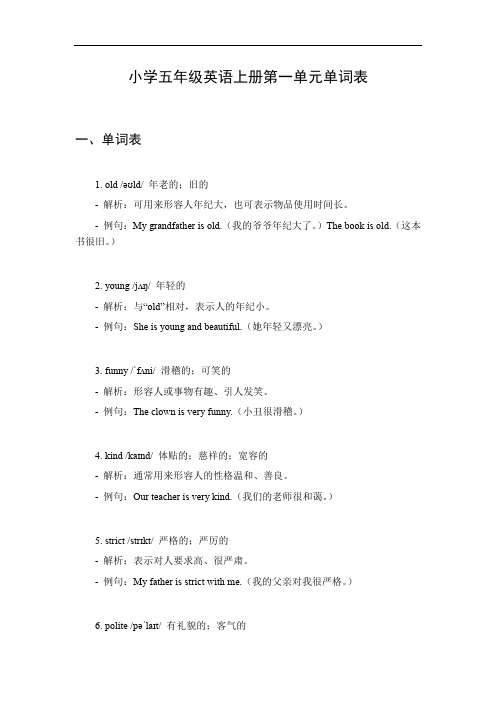
小学五年级英语上册第一单元单词表一、单词表1. old /əʊld/ 年老的;旧的-解析:可用来形容人年纪大,也可表示物品使用时间长。
-例句:My grandfather is old.(我的爷爷年纪大了。
)The book is old.(这本书很旧。
)2. young /jʌŋ/ 年轻的-解析:与“old”相对,表示人的年纪小。
-例句:She is young and beautiful.(她年轻又漂亮。
)3. funny /ˈfʌni/ 滑稽的;可笑的-解析:形容人或事物有趣、引人发笑。
-例句:The clown is very funny.(小丑很滑稽。
)4. kind /kaɪnd/ 体贴的;慈祥的;宽容的-解析:通常用来形容人的性格温和、善良。
-例句:Our teacher is very kind.(我们的老师很和蔼。
)5. strict /strɪkt/ 严格的;严厉的-解析:表示对人要求高、很严肃。
-例句:My father is strict with me.(我的父亲对我很严格。
)6. polite /pəˈlaɪt/ 有礼貌的;客气的-解析:形容人的行为举止有礼貌。
-例句:He is a polite boy.(他是一个有礼貌的男孩。
)7. hard-working /ˌhɑːd ˈwɜːkɪŋ/ 努力工作的;勤奋的-解析:由“hard(努力地)”和“working(工作)”组成,表示工作努力。
-例句:She is a hard-working student.(她是一个勤奋的学生。
)8. helpful /ˈhelpfl/ 有用的;愿意帮忙的-解析:表示能够给予帮助、很有用处。
-例句:He is always helpful.(他总是很乐于助人。
)9. clever /ˈklevə(r)/ 聪明的;聪颖的-解析:形容人头脑灵活、聪明。
-例句:The boy is very clever.(这个男孩很聪明。
五年级上学期英语知识点归纳(M1)
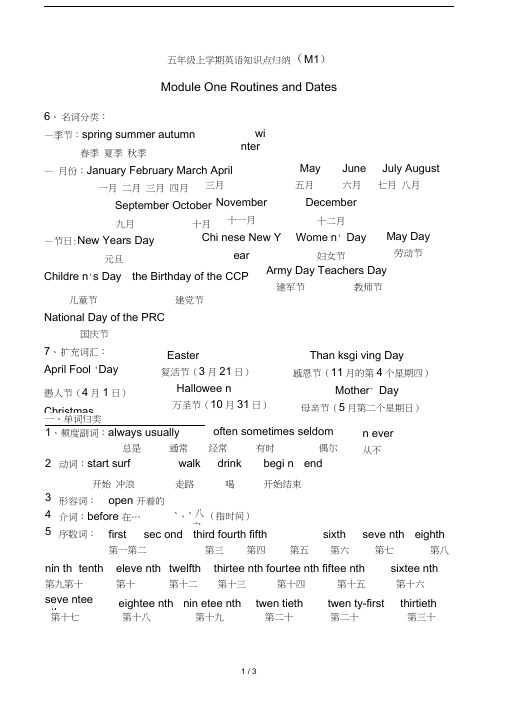
五年级上学期英语知识点归纳(M1)Module One Routines and Dates一、单词归类1、频度副词:always usuallyoften sometimes seldomn ever从不总是 通常经常有时偶尔2、动词:start surfwalkdrinkbegi n end开始 冲浪走路喝开始结束3、 形容词: open 开着的4、介词:before 在…、,、八 ••…之(指时间)5、序数词: first sec ond third fourth fifthsixthseve nth eighth第一第二第三 第四第五第六第七第八nin th tenth eleve nth twelfth thirtee nth fourtee nth fiftee nthsixtee nth第九第十第十 第十二 第十三 第十四 第十五第十六seve ntee nth eightee nth nin etee nthtwen tiethtwen ty-firstthirtieth第十七第十八第十九第二十第二十第三十6、 名词分类:—季节:spring summer autumn春季 夏季 秋季— 月份:January February March April一月 二月 三月 四月September October 九月十月—节日:New Years Day元旦Childre n 's Day the Birthday of the CCP儿童节建党节National Day of the PRC国庆节7、 扩充词汇: April Fool 'Day愚人节(4月1日)Christmaswinter冬季三月November十一月Chi nese New YearMay五月December十二月Wome n ' Day妇女节June六月July August七月 八月May Day劳动节Army Day Teachers Day建军节教师节Easter复活节(3月21日) Hallowee n万圣节(10月31日)Than ksgi ving Day感恩节(11月的第4个星期四)Mother ' Day母亲节(5月第二个星期日)1、 问: Would you like to go to school with me tomorrow?你愿意明天和我一起去上学吗?答:Yes, that would be fun. 是的;那一定很有趣.2、 问:How often do you watch TV ?你有多经常看电视?答: I watch TV every weekend. 3、 问:How often does Li Hong go for a walk ? Li Hong 有多经常去散步?答: She goes for a walk every evening.她每天晚上都去散步.4、 问: How many terms are there in your school year?你的一学年有几个学期? 答:There are two 有两个.5、 问:What 'the date today 今天是几月几号? /今天的日期是什么? 答:It 'September201.是九月 20 日6、 It starts in January and ends in March.它开始于一月; 结束于三月 .7、 My mum never makes noodles. 我妈妈从来不会做面条.8 日期的顺说法:Childre n 'Day is on Ju ne the first. 日期的逆说法:Childre n 'Day ison the first of Jun e.四、语法小知识:1、序数词的变化是特殊变化的有 7个:one - first two —second three - third five -fifth ( ________ 改为 _____ ,力口 th )Father 'Day父亲节(6月第3个周日)Qing Ming Festival清明节(4月4、5、或6日)二、词组go to work go for a walk去上班去散步Mid-autu mn Festival中秋节(农历八月十五)Lantern Festival元宵节(农历正月十五)go shopp ing去购物Drago n Boat Festival端午节(农历五月初五)Double Ninth Festival重阳节(农历九月初九)take exercise do some read ing锻炼身体读点书do my homework做我的作业visit the museum 参观博物馆school year start in学年 开始于the begi nning of theyear 一年的开始三、重点句型surf the Net上网Childre n 'Palace少年宫end in结束于after class下课后on holiday 在度假beg in in开始于the end of the year一年的结尾after dinner after work晚餐后下班后at the weekend on weekdays在周末在工作日like …best a photo of …最喜欢 .... 一张 ........ 的照片nine -ninth (去_______ 加th) twelve -twelfth ( _____ 改为______ 加th)整十 twenty -twentieth ( _____ 改为 ______ 加 th )2、介词在时间上的用法:in 力口一段时间 in September in the morning on 力口具体的一天on Mon day on the first of June at 加具体的时间at 8:00 at the weeke nd3、动词有3种形式(我们现在所学的;以后还会增加)4、动词三单形式的变化和可数名词变复数中的一些变化规律是一样的;我们可以对比来记忆•如:1. 直接加 s 女口: play-plays2. 以 o,x,s,ch,sh 结尾的单词;力口 es 女口: watch-watches3. 以辅音加y 结尾;改y 为i ;加es 如:carry-carries (搬;抬)4. 特殊变化 女口: have-has 5、在做“用动词话当形式填空”这种题目时:第一步判断句子时态(是一般现在时;还是现在进行时) 第二步判断主语是否三单第三步将动词做出相应的变化或保持不变6、现在进行时中; be 是 am, are, is 的原形; 它是根据主语而变化的 .I 用 am; we/you /they 用 are ; he/she/it 用 is动词的现在分词(i~ng^形式)句子是现在进行时;在 主语后加上与主语相 对应的be 动词;再加上动词的 ing动词dog-dogs bus-buses baby-babies goose-geese语是三单人称(he, she, it ,或等同于 he/she/it 的时候;要用 三单形式一般现在时;当句子的 主语是非三单人称(I,we, you, they )的时候;动词要用回原形我自己还有补充:。
人教版五年级英语上册unit1-单词讲解
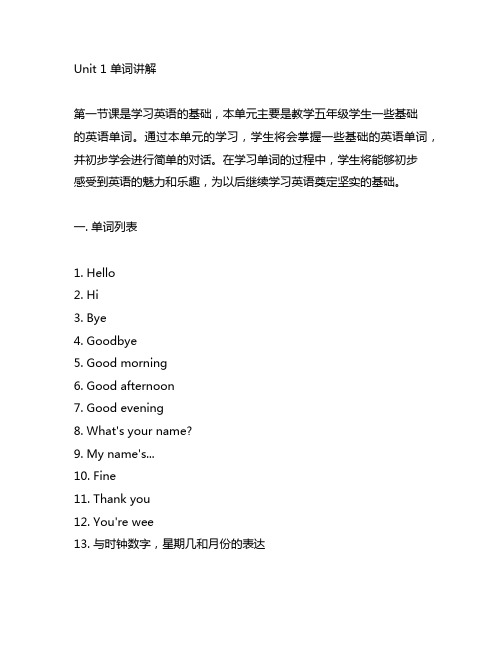
Unit 1 单词讲解第一节课是学习英语的基础,本单元主要是教学五年级学生一些基础的英语单词。
通过本单元的学习,学生将会掌握一些基础的英语单词,并初步学会进行简单的对话。
在学习单词的过程中,学生将能够初步感受到英语的魅力和乐趣,为以后继续学习英语奠定坚实的基础。
一. 单词列表1. Hello2. Hi3. Bye4. Goodbye5. Good morning6. Good afternoon7. Good evening8. What's your name?9. My name's...10. Fine11. Thank you12. You're wee13. 与时钟数字,星期几和月份的表达二. 单词讲解1. Hello和Hi这两个都是打招呼用语,表示你好,你可以用它们来和别人打招呼。
2. Goodbye表示再见,当你和别人分别的时候可以用这个词。
3. Good morning,Good afternoon和Good evening这三个都是问候用语,分别表示早上好,下午好,晚上好。
4. What's your name?和My name's...“What's your name?”的意思是你叫什么名字?“My name's...”的意思是我的名字叫...5. Fine表示好的,当别人问你“how are you?”时,你可以回答“I'm fine”,意思是我很好。
6. Thank you和You're wee“Thank you”表示谢谢,当别人帮助你时,你应该说一声谢谢。
“You're wee”表示不用谢,对方回答“Thank you”时,你可以说“You're wee”。
7. 时间、星期几和月份的表达在这个单元中,学生还将学习到英语中表示时间、星期几和月份的表达方式,这对于以后的学习将有很大的帮助。
最新外研版五年级英语上册M1--M2知识归纳
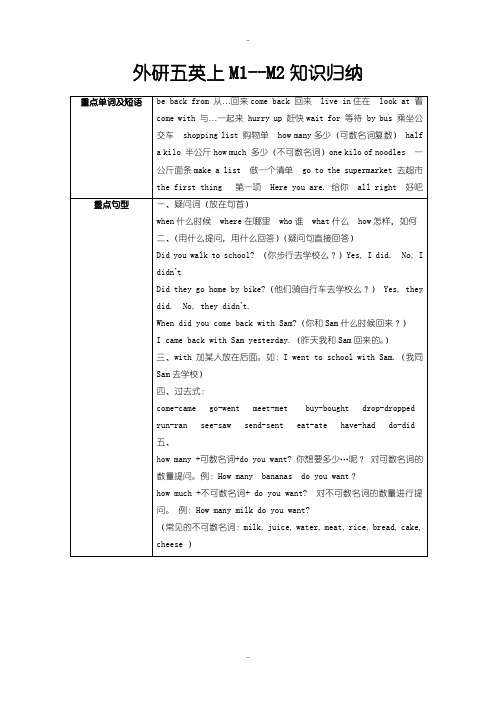
五、
how many +可数名词+do you want?你想要多少…呢?对可数名词的数量提问。例:How many bananas do you want?
how much +不可数名词+ do you want?对不可数名词的数量进行提问。例:How many milk do you want?
When did you come back with Sam?(你和Sam什么时候回来?)
I came back with Sam yesterday.(昨天我和Sam回来的。)
三、with加某人放在后面。如:I went to school with Sam.(我同Sam去学校)
四、过去式:
come-came go-went meet-met buy-bought drop-dropped
外研五英上M1--M2知识归纳
重点单词及短语
be back from从…回来come back回来live in住在look at看come with与…一起来hurry up赶快wait for等待by bus乘坐公交车shopping list购物单how many多少(可数名词复数)half a kilo半公斤how much多少(不可数名词)one kilo of noodles一公斤面条make a list做一个清单go to the supermarket去超市the first thing第一项Here you are.给你all right好吧
重点句型
一、疑问词(放在句首)ห้องสมุดไป่ตู้
when什么时候where在哪里who谁what什么how怎样,如何
五上M1知识点

五年级M1知识点一、单词:1、met (meet的过去式)遇见2、above 在……上方,在……之上3、ground 地面4、those那些5、ice cream冰激凌6、us (宾格)我们7、finish吃完,喝完,用尽8、wait 等待,等候9、hurry 赶紧,匆忙10、hurry up 赶紧,赶快11、dropped (drop的过去式)(无意中)使掉落12、send 发送,寄13、email 电子邮件14、ran (run)的过去式跑15、love 爱你的二、短语:1. come back 回来2. a littie boy 一个小男孩3. the London Eye 伦敦眼4. above the ground 在地面上方5. in London 在伦敦6. last Sunday 上周日7. our Chinese friend 我们的中国朋友8. live in 住在9. look at 看10. ice cream 冰激凌11. go home 回家12. come with us 和我们一起吧13. wait for me 等等我14. hurry up 赶紧,赶快15. send an email 发送电子邮件16. go to the park 去公园17. in the park 在公园18. by bus 乘公交车三、动词过去式:1. go---went2. meet------met3. see---- saw4. do---did5. come----came6.have---had7. drop----dropped 8. visit----visited 9. is----was10. buy---bought 11. run----ran四、句子:1.—Did you come back yesterday? —No,we came back last Sunday.(过去时态的一般疑问句,助动词do、does、did在句子中没有实际意义,引导一般疑问句时放在句首,句中动词用原形。
小学五年级英语单词表(上册)-知识汇总
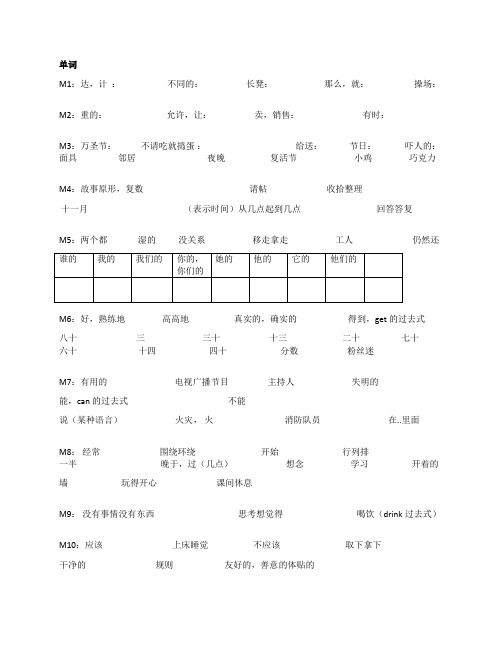
单词M1:达,计:不同的:长凳:那么,就:操场:M2:重的:允许,让:卖,销售:有时:M3:万圣节:不请吃就捣蛋:给送:节日:吓人的:面具邻居夜晚复活节小鸡巧克力M4:故事原形,复数请帖收拾整理十一月(表示时间)从几点起到几点回答答复M5:两个都湿的没关系移走拿走工人仍然还M6:好,熟练地高高地真实的,确实的得到,get的过去式八十三三十十三二十七十六十十四四十分数粉丝迷M7:有用的电视广播节目主持人失明的能,can 的过去式不能说(某种语言)火灾,火消防队员在..里面M8:经常围绕环绕开始行列排一半晚于,过(几点)想念学习开着的墙玩得开心课间休息M9:没有事情没有东西思考想觉得喝饮(drink过去式)M10:应该上床睡觉不应该取下拿下干净的规则友好的,善意的体贴的课文1 .1 There wasn’t a clock her before. ( There be 句型,表示有,was, were 过去式,过去有什么)Two years ago, yesterday, last weekend, Now1) This was the pig’s house. There was a big mouse. ( two years ago)2)This is the cat’s house. There isn’t a mouse. ( now)Lingling is in London with Sam and Amy.You were in China for two years. Does London look different now?Yes, it does.This park is different. There weren’t any benches here before. (any 用于否定句疑问句,some 肯定句)Look! There’s a clock. There wasn’t a clock here before.There is one now. There are birds, too.Do you like the park now? Yes. I do. We can feed the birds.Then, let’s feed them. Great!M1U2 There are tall trees now.M2U1 This one is heavy.M2U2 They sell many different things.M3U1 Today is Halloween.M3U2 Easter is in spring in the UK.M4U1 We’re going to tell stories.M4U2 I’m going to be eleven.M5U1 It’s mine.M5U2 Amy’s blue dress is wet.M6U1 You can play basketball well.M6U2 They got seventy points.M7U1 His dog can help him.M7U2 It could find the people.M8U1 Children often sit around tables. M8U2 There are lots of games.M9U1 Are you sad?M9U2 She was very happy.M10U1 You should tidy your toys.M10U2 You shouldn’t be late.星期星期一:Mon.=Monday星期二:Tues.=Tuesday星期三:Wed.=Wednesday星期四:Thur.=Thursday星期五:Fri.=Friday星期六:Sat.=Saturday星期天:Sun.=Sunday月份一月份=JAN.Jan.=January二月份=FEB.Feb.=February三月份=MAR.Mar.=March四月份=APR.Apr.=April五月份=MAY May=May六月份=JUN.Jun.=June七月份=JUL.Jul.=July八月份=AUG.Aug.=August九月份=SEP.Sept.=September十月份=OCT.Oct.=October十一月份=NOV.Nov.=November 十二月份=DEC.Dec.=December国家。
五上第一单元单词表
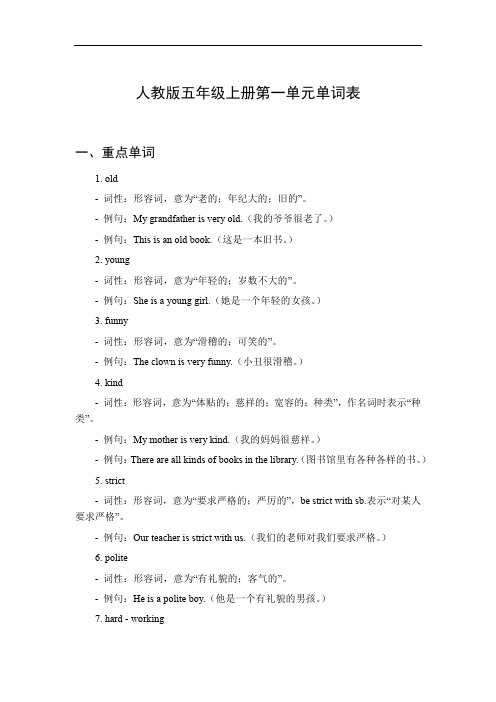
人教版五年级上册第一单元单词表一、重点单词1. old-词性:形容词,意为“老的;年纪大的;旧的”。
-例句:My grandfather is very old.(我的爷爷很老了。
)-例句:This is an old book.(这是一本旧书。
)2. young-词性:形容词,意为“年轻的;岁数不大的”。
-例句:She is a young girl.(她是一个年轻的女孩。
)3. funny-词性:形容词,意为“滑稽的;可笑的”。
-例句:The clown is very funny.(小丑很滑稽。
)4. kind-词性:形容词,意为“体贴的;慈祥的;宽容的;种类”,作名词时表示“种类”。
-例句:My mother is very kind.(我的妈妈很慈祥。
)-例句:There are all kinds of books in the library.(图书馆里有各种各样的书。
)5. strict-词性:形容词,意为“要求严格的;严厉的”,be strict with sb.表示“对某人要求严格”。
-例句:Our teacher is strict with us.(我们的老师对我们要求严格。
)6. polite-词性:形容词,意为“有礼貌的;客气的”。
-例句:He is a polite boy.(他是一个有礼貌的男孩。
)7. hard - working-词性:形容词,意为“工作努力的;辛勤的”。
-例句:My father is hard - working.(我的爸爸工作很努力。
)8. helpful-词性:形容词,意为“有用的;愿意帮忙的”。
-例句:He is a helpful student.(他是一个乐于助人的学生。
)9. clever-词性:形容词,意为“聪明的;聪颖的”。
-例句:The little monkey is very clever.(小猴子很聪明。
)10. shy-词性:形容词,意为“羞怯的;腼腆的;怕生的”。
五年级上册1单元单词表

五年级上册1单元单词表
人教版五年级上册英语第一单元单词。
1. old [əʊld] adj. 老的;年纪大的。
2. young [jʌŋ] adj. 年轻的;岁数不大的。
3. funny [ˈfʌni] adj. 滑稽的;可笑的。
4. kind [kaɪnd] adj. 体贴的;慈祥的;宽容的。
5. strict [strɪkt] adj. 要求严格的;严厉的。
6. polite [pəˈlaɪt] adj. 有礼貌的;客气的。
7. hard - working [hɑː d ˈwɜːkɪŋ] adj. 工作努力的;辛勤的。
8. helpful [ˈhelpfl] adj. 有用的;愿意帮忙的。
9. clever [ˈklevə(r)] adj. 聪明的;聪颖的。
10. shy [ʃaɪ] adj. 羞怯的;腼腆的;怕生的。
11. know [nəʊ] v. 知道;了解。
12. our [ˈaʊə(r)] pron. 我们的。
13. Ms [mɪz] (用于女子的姓氏或姓名前,不指明婚否)女士。
14. will [wɪl] (谈及将来)将要。
15. sometimes [ˈsʌmtaɪmz] adv. 有时;间或。
16. robot [ˈrəʊbɒt] n. 机器人。
17. him [hɪm] pron. (he的宾格)他。
18. speak [spiːk] v. 会说;会讲(某种语言);用(某种语言)说话。
五年级上册英语第一单元单词表

五年级上册英语第一单元单词表一、old [əʊld] adj.(形容词)1. 老的;年纪大的。
例如:My grandfather is very old.(我的爷爷很老了。
)2. 旧的。
例如:This is an old book.(这是一本旧书。
)二、young [jʌŋ] adj.(形容词)年轻的;岁数不大的。
例如:She is a young girl.(她是一个年轻的女孩。
)三、funny [ˈfʌni] adj.(形容词)1. 滑稽的;可笑的。
例如:The clown looks very funny.(这个小丑看起来很滑稽。
)2. 奇怪的。
例如:There is a funny smell in the room.(房间里有一股奇怪的气味。
)四、kind [kaɪnd] adj.(形容词)1. 体贴的;慈祥的;宽容的。
例如:My mother is very kind.(我的妈妈很慈祥。
)2. 种类。
例如:There are all kinds of books in the library.(图书馆里有各种各样的书。
)(作“种类”时为名词)五、strict [strɪkt] adj.(形容词)要求严格的;严厉的。
例如:Our teacher is very strict.(我们的老师很严格。
)六、polite [pəˈlaɪt] adj.(形容词)有礼貌的;客气的。
例如:He is a polite boy.(他是一个有礼貌的男孩。
)七、hard - working [ˌhɑː d ˈwɜːkɪŋ] adj.(形容词)工作努力的;辛勤的。
例如:My father is hard - working.(我的爸爸工作很努力。
)八、helpful [ˈhelpfl] adj.(形容词)有用的;愿意帮忙的。
例如:He is very helpful at home.(他在家很愿意帮忙。
)九、clever [ˈklevə(r)] adj.(形容词)聪明的;聪颖的。
小学英语五年级上册M1知识点积累
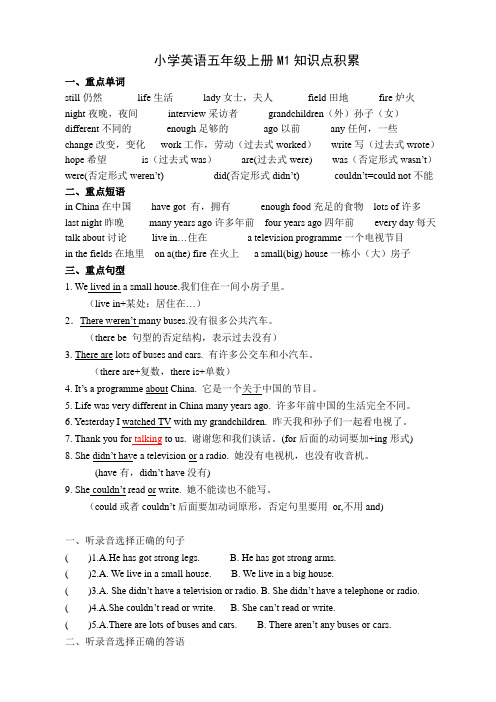
小学英语五年级上册M1知识点积累一、重点单词still仍然life生活lady女士,夫人field田地fire炉火night夜晚,夜间interview采访者grandchildren(外)孙子(女)different不同的enough足够的ago以前any任何,一些change改变,变化work工作,劳动(过去式worked)write写(过去式wrote)hope希望is(过去式was)are(过去式were) was(否定形式wasn’t)were(否定形式weren’t) did(否定形式didn’t) couldn’t=could not不能二、重点短语in China在中国have got 有,拥有enough food充足的食物lots of许多last night昨晚many years ago许多年前four years ago四年前every day每天talk about讨论live in…住在 a television programme一个电视节目in the fields在地里on a(the) fire在火上 a small(big) house一栋小(大)房子三、重点句型1. We lived in a small house.我们住在一间小房子里。
(live in+某处:居住在…)2.There weren’t many buses.没有很多公共汽车。
(there be 句型的否定结构,表示过去没有)3. There are lots of buses and cars. 有许多公交车和小汽车。
(there are+复数,there is+单数)4. It’s a programme about China. 它是一个关于中国的节目。
5. Life was very different in China many years ago. 许多年前中国的生活完全不同。
最新五年级上册单词表第一单元

Words in Unit 1 第一单元词汇(五上)old /əʊld/ 老的;年纪大的young /jʌŋ/ 年轻的;岁数不大的funny /'fʌ nɪ/ 滑稽的;可笑的kind /kaɪnd/ 体贴的;慈祥的;宽容的strict /strɪkt/ 要求严格的;严厉的polite /pə 'laɪt/ 有礼貌的;客气的hard-working /hɑːd 'wɜː kɪŋ/ 工作努力的;辛勤的helpful /'help fʊl/ 有用的;愿意帮忙的clever /'kle və/ 聪明的;聪颖的shy /ʃaɪ/ 羞怯的;腼腆的;怕生的know /nəʊ/ 知道;了解our /'aʊə/ 我们的Ms /mɪz/ (用于女子的姓氏或姓名前,不指明婚否)女士will /wɪl/ (谈及将来)将要;愿意sometimes /'sʌm taɪmz/ 有时;间或;偶尔robot /'rəʊ bɒt/ 机器人him /hɪm/ (用作宾语或表语)他speak /spiːk/ 会说;会讲(某种语言);用(某种语言)说话finish /'fɪ nɪʃ/ 完成;做好Words in Unit 1 第一单元词汇(五上)old /əʊld/ 老的;年纪大的young /jʌŋ/ 年轻的;岁数不大的funny /'fʌ nɪ/ 滑稽的;可笑的kind /kaɪnd/ 体贴的;慈祥的;宽容的strict /strɪkt/ 要求严格的;严厉的polite /pə 'laɪt/ 有礼貌的;客气的hard-working /hɑːd 'wɜː kɪŋ/ 工作努力的;辛勤的helpful /'help fʊl/ 有用的;愿意帮忙的clever /'kle və/ 聪明的;聪颖的shy /ʃaɪ/ 羞怯的;腼腆的;怕生的know /nəʊ/ 知道;了解our /'aʊə/ 我们的Ms /mɪz/ (用于女子的姓氏或姓名前,不指明婚否)女士will /wɪl/ (谈及将来)将要;愿意sometimes /'sʌm taɪmz/ 有时;间或;偶尔1/ 2robot /'rəʊ bɒt/ 机器人him /hɪm/ (用作宾语或表语)他speak /spiːk/ 会说;会讲(某种语言);用(某种语言)说话finish /'fɪ nɪʃ/ 完成;做好2/ 2。
- 1、下载文档前请自行甄别文档内容的完整性,平台不提供额外的编辑、内容补充、找答案等附加服务。
- 2、"仅部分预览"的文档,不可在线预览部分如存在完整性等问题,可反馈申请退款(可完整预览的文档不适用该条件!)。
- 3、如文档侵犯您的权益,请联系客服反馈,我们会尽快为您处理(人工客服工作时间:9:00-18:30)。
五年级上册Module 1Module 1met _________________________[met]v. above __________________[ə'bʌv]prep. ground ___________________[graʊnd]n. those ____________________[ əʊz]pron. ice cream _______________[a s][kri:m]n.us ____________________[[əs][ʌs]pron. finish _____________________['f n ʃ]v. wait________________________[we t]v. hurry ____________________['hʌri]v./n. hurry up _________________['hʌri][ʌp] dropped ____________________[drɒp t]v. send _______________________[send]v. email_____________________['i:me l]n.ran _________________________[ræn]v. love ________________________[lʌv]v. M1知识点went _____________________________ visited ___________________________ saw ______________________________ did ______________________________ live ______________________________ bought ___________________________ phone____________________________ watched__________________________ from_____________________________ with______________________________ be back from...(China)_________________ yesterday_________________________ Last(Sunday)___________________ ___Thisis...__________________________ near___________________________ ___these-this_______________________ those-that______________________ Let’s...(buy)+动词原形_________________ be going to_____________________ new--old_______________________ didn’t=________________________ for____________________________ go to the park___________________ in the park_____________________ go home________________________ run to the bus___________________ walk to the bus__________________ drop my ice cream_______________ 一、词的分类不定冠词a_____________________________ an____________________________ 名词n.1 g__________复数形式2 i____c_______复数形式3 e___________复数形式___________动词v.1 ___________三单_________________________ing形式__________________过去式m___________________ 2 f___________三单________________________ing形式_________________过去式____________________3 w___________三单________________________ing形式________________过去式___________________4 ___________三单________________________ing形式________________过去式d___________________5 s___________三单________________________ ing形式________________过去式___________________6 ___________三单________________________ing形式________________过去式r___________________7 l___________三单________________________ ing形式________________过去式___________________8 ___________三单________________________ing形式________________过去式w___________________9 ___________三单________________________ing形式________________过去式v___________________ 10 ___________三单________________________ ing形式________________过去式s___________________ 11 w___________三单________________________ ing形式________________过去式d___________________ 12 l___________三单________________________ ing形式________________过去式___________________13 ___________三单________________________ ing形式________________过去式b___________________ 14 ___________三单________________________ ing形式________________过去式p___________________ 15 ___________三单________________________ ing形式________________过去式w___________________二、句子1 A:Did you come back yesterday? B: No, we came back last Sunday. A: Did Lingling phone you?B: No, she didn’t.A: Did she send you an email?B: No, she didn’t. 2 Oh no! I dropped my ice cream!3 We bought ice creams.三、语法1一般过去时(一般过去时表示①过去某个时间里发生的动作或状态;②过去习惯性、经常性的动作、行为;③过去主语所具备的能力和性格。
)构成:①主语+was/were+其他()②主语+动词过去式+其他()句型变换:肯定句:我们买了冰淇淋。
____________________________________否定句:我们没买冰淇淋。
___________________________________一般疑问句及肯否回答:你们买了冰淇淋吗?________________________________________________________________________特殊疑问句:--你们买了什么?--我们买了冰淇淋。
_____________________________________ _____________________________________2祈使句(表示要对方做或不做某事、带有祈使语气的句子Let’s 开头,动词原形开头等。
)① Let’s buy some.② Finish your ice cream, Lingling.③ Wait for me!四、常识London(['lʌndən])Town:伦敦,是大不列颠及北爱尔兰联合王国(简称英国)首都,欧洲最大的城市。
与美国纽约并列世界上最大的金融中心。
London Eye:伦敦眼,坐落在英国伦敦泰晤士河畔,是世界上首座、同时截至2005年最大的观景摩天轮,为伦敦的地标及出名旅游观光点之一。
伦敦街头的红色双层巴士:伦敦双层巴士车顶圆角设计,车尾开放式登车门以及车尾楼梯,全景式车顶,车身中间有一道车门,并设有升降平台以供残障人士使用。
此外,车内座椅采用了真皮材质,并加入了令人感觉温暖的灯光和本质地板,让乘客有种在家的舒适感。
上海:中华人民共和国直辖市,国家中心城市,超大城市,中国的经济、金融、贸易、航运中心,首批沿海开放城市。
欢迎你来补充:首先,与中国公交车几乎逢站必停的情况大为不同,在英国,上下车都要提前示意,否则公交车很可能会过站不停。
等公车时,尤其是候车乘客较少的时候,看到要乘坐的公交到来,一定要面对公交车招手示意,否则公交司机会以为无人要搭乘本趟车,过站不停。
此外,英国公交车上没有语音报站,只有一个小屏幕显示站名。
你必须自己留意到站情况。
另外,车内有许多扶手杆,每个扶手杆上都有一个按钮。
到站下车前,需要按一下按钮示意下车,不然,司机以为没人下车也会过站不停。
这一点其实倒体现了英国人的高效。
因为英国人少,不是每一站都有乘客上下。
所以这样做可以提高公交车的运营效率。
下车需提前按按钮其次,英国公交车上没有专门售票员,只有司机一人负责乘客买票、验票、刷卡、找零等工作。
当地固定乘客一般都会刷公交卡,但也有不少初到当地的游客、留学生等使用现金买票,而公交车司机也会非常有耐心地给你出票,找零。
